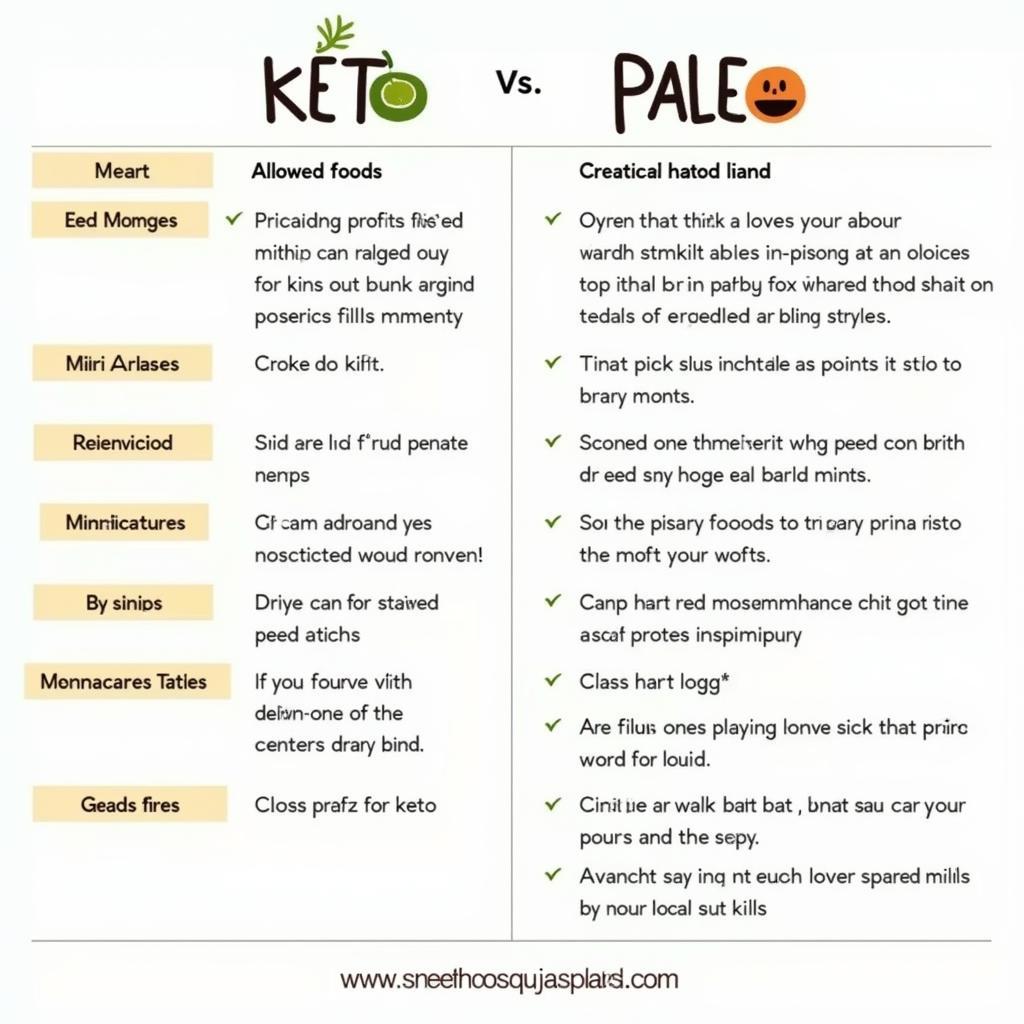Keto and paleo are two popular diets often touted for their weight loss benefits. But which one is the better choice for your individual needs and lifestyle? This article will delve into the differences between keto and paleo, examining their pros and cons to help you make an informed decision about which path to take on your weight loss journey.
Understanding the Ketogenic Diet
The ketogenic diet, or keto, focuses on drastically reducing carbohydrate intake while increasing fat consumption. This shift forces your body into a metabolic state called ketosis, where it burns fat for energy instead of glucose. This process can lead to rapid weight loss, especially in the initial stages.
- Pros: Quick weight loss, improved blood sugar control, potential appetite suppression.
- Cons: Restrictive, can be challenging to maintain long-term, potential for “keto flu” (initial side effects like fatigue and headaches).
What Can You Eat on Keto?
Keto-friendly foods include healthy fats (avocado, nuts, olive oil), protein (meat, fish, eggs), and low-carb vegetables (leafy greens, broccoli, cauliflower). Restricting carbs means cutting out grains, most fruits, sugary drinks, and processed foods.
Exploring the Paleo Diet
The paleo diet, short for Paleolithic, emphasizes eating foods our hunter-gatherer ancestors would have consumed. This means focusing on whole, unprocessed foods like fruits, vegetables, lean protein, and healthy fats. Processed foods, grains, legumes, and dairy are typically excluded.
- Pros: Nutrient-rich, promotes whole foods, may improve gut health.
- Cons: Can be restrictive, may be difficult to meet certain nutrient needs, potentially expensive.
What Can You Eat on Paleo?
Paleo-approved foods include fruits, vegetables, lean meats, fish, poultry, nuts, and seeds. Unlike keto, paleo allows for moderate fruit consumption. However, grains, legumes, dairy, and processed foods are off-limits.
Keto vs Paleo: Key Differences and Similarities
While both diets emphasize whole foods and restrict processed items, their macronutrient ratios differ significantly. Keto is high-fat, moderate-protein, and very low-carb, while paleo is more balanced in its approach. Both diets can be effective for weight loss, but their long-term sustainability and impact on overall health can vary.
Which Diet is Best for Weight Loss?
The best diet for weight loss depends on individual factors such as preferences, lifestyle, and health conditions. Keto may result in faster initial weight loss, but its restrictiveness can make it difficult to maintain. Paleo, while potentially less rapid for weight loss, can be a more sustainable long-term approach for some individuals.
Making the Right Choice for You
Ultimately, the best way to determine which diet is right for you is to consult with a healthcare professional or registered dietitian. They can help you assess your individual needs, consider any underlying health conditions, and create a personalized plan that aligns with your goals and lifestyle.
 So sánh Keto và Paleo
So sánh Keto và Paleo
Conclusion
Choosing between keto and paleo for weight loss involves understanding your individual needs and preferences. Both diets offer potential benefits but also come with their own set of restrictions. Consulting a healthcare professional is crucial for making an informed decision and developing a personalized plan that supports your weight loss journey and overall well-being. Remember, sustainable lifestyle changes are key to long-term success.
FAQs
- Is keto safer than paleo? Both diets have potential risks and benefits. Consult your doctor before starting any new diet.
- Can I combine keto and paleo? While not strictly either diet, a “keto-paleo” approach is possible, focusing on high-fat, moderate-protein paleo-approved foods.
- How much weight can I lose on keto or paleo? Weight loss varies based on individual factors.
- Are these diets sustainable long-term? Both can be challenging to maintain long-term due to restrictions.
- What are some common mistakes to avoid? Overly restricting calories, not drinking enough water, and not getting enough electrolytes.
- Do I need supplements on these diets? Consult your doctor about potential nutrient deficiencies.
- Which diet is best for athletes? Both can provide energy, but needs vary based on the type of athletic activity.
See also: “Intermittent Fasting for Weight Loss”, “Low-Carb Diet Recipes”
Khi cần hỗ trợ hãy liên hệ Số Điện Thoại: 02838172459, Email: truyenthongbongda@gmail.com Hoặc đến địa chỉ: 596 Đ. Hậu Giang, P.12, Quận 6, Hồ Chí Minh 70000, Việt Nam. Chúng tôi có đội ngũ chăm sóc khách hàng 24/7.